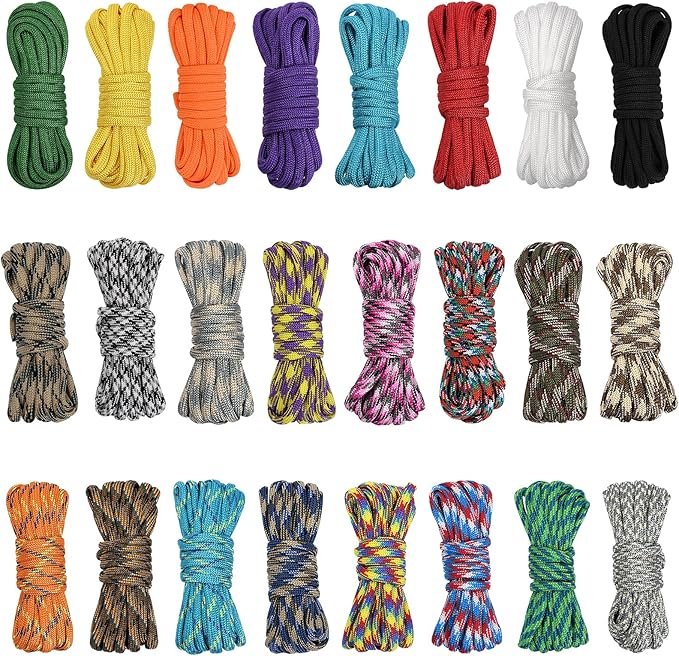
What Rope is Stronger Than Nylon Rope?
Have you ever wondered what makes nylon rope so popular? Whether you’re tying down a tent, securing a boat, or just need a strong rope for a DIY project, nylon rope is often the go-to choice. It’s known for being tough, stretchy, and able to handle water and sunlight without breaking down. But here’s a question: Is nylon rope the strongest rope out there?
In this article, we’re going to explore ropes that might be even stronger than nylon. We’ll look at what makes these ropes special, where they’re used, and how they compare to nylon. By the end, you’ll have a better idea of which rope is the best fit for your needs.
So, let’s dive in and find out: What rope is stronger than nylon rope?
What Makes Nylon Rope Strong?
Nylon rope is like the superhero of ropes—it’s strong, flexible, and can handle a lot of tough jobs. But what exactly makes it so powerful? Let’s break it down and see why nylon rope is such a popular choice for so many people.
1. High Tensile Strength
First, nylon rope is incredibly strong. “Tensile strength” is just a fancy way of saying how much weight a rope can hold before it breaks. Nylon rope has a high tensile strength, which means it can handle heavy loads without snapping. Whether you’re lifting something heavy or tying down a big object, nylon rope won’t let you down.
2. Stretchy and Shock-Absorbing
One of the coolest things about nylon rope is that it’s stretchy. This might sound like a bad thing, but it’s actually a big advantage. When you pull on nylon rope, it can stretch a little to absorb shock. This makes it perfect for jobs where there’s sudden tension, like towing a car or securing a boat in rough water. The stretchiness helps prevent the rope from breaking under pressure.
3. Resistant to Water and UV Rays
Nylon rope is also great for outdoor use because it doesn’t mind getting wet or sitting in the sun. Unlike some other materials, nylon doesn’t rot or weaken when exposed to water. Plus, it can handle UV rays from the sun without breaking down over time. This makes it a top choice for activities like camping, boating, or any job that involves being outside.
4. Durable and Long-Lasting
Another reason nylon rope is so popular is its durability. It’s tough enough to resist wear and tear, even when used in rough conditions. Whether you’re dragging it over rocks, tying it around sharp edges, or using it in heavy-duty jobs, nylon rope can take the abuse and keep going.
5. Affordable and Versatile
Finally, nylon rope is affordable and can be used for almost anything. It’s not the most expensive rope out there, but it’s strong enough for most everyday tasks. From tying down a load on your truck to setting up a clothesline, nylon rope is a handy tool to have around.

Ropes Stronger Than Nylon Rope
Nylon rope is super strong, but did you know there are ropes out there that are even stronger? These ropes are made from special materials that give them extra power for tough jobs. Let’s take a closer look at three ropes that might be stronger than nylon—Dyneema®, Kevlar®, and polyester—and find out what makes them so special.
1. Dyneema® Rope: The Lightweight Champion
Dyneema® rope is like the superhero of ropes. It’s made from a super-strong fiber that’s incredibly lightweight but can hold a lot of weight. In fact, Dyneema® is one of the strongest ropes in the world!
- Why It’s Strong: Dyneema® has an amazing strength-to-weight ratio, which means it’s very strong for its size. It’s also resistant to water and UV rays, just like nylon.
- Where It’s Used: People use Dyneema® rope for high-stress jobs like sailing, climbing, and even in the military.
- Fun Fact: Dyneema® is so strong that it’s often used to make bulletproof vests!
2. Kevlar® Rope: The Tough Protector
Kevlar® rope is another super-strong option. You might have heard of Kevlar® because it’s used to make protective gear like helmets and gloves.
- Why It’s Strong: Kevlar® is made from heat-resistant fibers that are incredibly tough. It doesn’t stretch much, so it’s great for jobs where you need a rope to stay tight.
- Where It’s Used: Kevlar® rope is often used in industries like aerospace, law enforcement, and construction.
- Fun Fact: Kevlar® is so tough that it’s used to make ropes that can handle extreme heat and heavy loads.
3. Polyester Rope: The Reliable Workhorse
Polyester rope is another strong option that’s often compared to nylon. While it’s not as stretchy as nylon, it has some cool features that make it a great choice for certain jobs.
- Why It’s Strong: Polyester rope is very resistant to UV rays, so it doesn’t break down in the sun. It’s also less stretchy than nylon, which makes it good for jobs where you need a rope to stay tight.
- Where It’s Used: Polyester rope is often used for mooring boats, outdoor activities, and industrial tasks.
- Fun Fact: Polyester rope is popular in the boating world because it doesn’t soak up water like some other ropes.
How Do These Ropes Compare to Nylon?
While Dyneema®, Kevlar®, and polyester ropes are stronger than nylon in some ways, they’re not always the best choice for every job. Here’s a quick comparison:
- Dyneema®: Stronger and lighter than nylon, but more expensive.
- Kevlar®: Tougher and heat-resistant, but less stretchy and pricier.
- Polyester: More UV-resistant and less stretchy than nylon, but similar in strength.
Factors to Consider When Choosing a Rope
Choosing the right rope can feel a bit like picking the perfect tool for a job. There are so many options out there—nylon, Dyneema®, Kevlar®, polyester, and more! But don’t worry, we’re here to help you figure out what to look for. Here are some important factors to consider when choosing a rope, explained in a simple and fun way.
1. Strength vs. Elasticity
- What It Means: Strength is how much weight a rope can hold, and elasticity is how much it can stretch.
- Why It Matters: Some jobs need a strong rope that doesn’t stretch much, like tying down a heavy load. Other jobs, like towing a car, need a stretchy rope to absorb shock.
- Example: Nylon rope is stretchy, which makes it great for jobs with sudden tension. Polyester rope is less stretchy, so it’s better for jobs where you need the rope to stay tight.
2. Environmental Resistance
- What It Means: This is how well the rope can handle things like water, sunlight, and extreme temperatures.
- Why It Matters: If you’re using the rope outdoors or in wet conditions, you’ll want one that can resist water and UV rays.
- Example: Nylon and polyester ropes are both great for outdoor use because they don’t mind water or sunlight. Kevlar® rope is heat-resistant, so it’s perfect for high-temperature jobs.
3. Cost
- What It Means: This is how much money you’ll need to spend on the rope.
- Why It Matters: Some ropes, like Dyneema® and Kevlar®, are very strong but also more expensive. Others, like nylon and polyester, are more affordable and still work well for many jobs.
- Example: If you’re on a budget, nylon rope is a great choice because it’s strong and affordable. But if you need a super-strong rope for a special job, it might be worth spending more on Dyneema® or Kevlar®.
4. Application
- What It Means: This is what you’ll be using the rope for.
- Why It Matters: Different jobs need different kinds of ropes. For example, climbing ropes need to be super strong and lightweight, while mooring ropes need to resist water and UV rays.
- Example: If you’re going sailing, Dyneema® rope is a great choice because it’s strong and lightweight. If you’re setting up a clothesline, nylon rope is a simple and affordable option.
5. Weight
- What It Means: This is how heavy the rope is.
- Why It Matters: If you’re carrying the rope around or using it for climbing, you’ll want one that’s lightweight.
- Example: Dyneema® rope is very lightweight, which makes it perfect for activities like hiking or climbing. Nylon rope is a bit heavier but still manageable for most jobs.
6. Durability
- What It Means: This is how long the rope will last and how well it can handle wear and tear.
- Why It Matters: If you’re using the rope for tough jobs, you’ll want one that’s durable and won’t break down quickly.
- Example: Kevlar® rope is super durable and can handle rough conditions, making it great for heavy-duty tasks. Nylon rope is also durable and works well for everyday use.
When to Choose Nylon Rope Over Stronger Alternatives
Even though there are ropes stronger than nylon, like Dyneema®, Kevlar®, and polyester, nylon rope is still a great choice for many jobs. It’s like the all-rounder of ropes—it might not be the absolute strongest, but it’s reliable, affordable, and works well in lots of situations. Let’s break down when nylon rope might still be the best pick for you.
1. For Everyday Jobs
- Why Nylon? Nylon rope is perfect for everyday tasks because it’s strong, stretchy, and easy to use.
- Examples: Tying down a load on your truck, setting up a tent, or even making a swing for your backyard.
- Why Not Stronger Ropes? Stronger ropes like Dyneema® or Kevlar® can be overkill for simple jobs and might cost more than you need to spend.
2. When You Need Stretchiness
- Why Nylon? Nylon rope is stretchy, which makes it great for jobs where there’s sudden tension or shock.
- Examples: Towing a car, securing a boat in rough water, or even tying down a tarp in windy weather.
- Why Not Stronger Ropes? Ropes like polyester or Kevlar® don’t stretch as much, so they might not absorb shock as well as nylon.
3. For Outdoor Use
- Why Nylon? Nylon rope is resistant to water and UV rays, so it won’t rot or break down when used outside.
- Examples: Camping, boating, or setting up a clothesline in your backyard.
- Why Not Stronger Ropes? While Dyneema® and polyester are also good for outdoor use, nylon is often more affordable and just as effective for most outdoor tasks.
4. When You’re on a Budget
- Why Nylon? Nylon rope is affordable and still strong enough for most jobs.
- Examples: DIY projects, gardening, or even just keeping a spare rope in your car for emergencies.
- Why Not Stronger Ropes? Ropes like Dyneema® and Kevlar® are much more expensive, so they might not be worth the extra cost if you don’t need their special features.
5. For General Durability
- Why Nylon? Nylon rope is tough and can handle wear and tear, making it a reliable choice for many tasks.
- Examples: Dragging heavy objects, tying down equipment, or even using it in rough conditions.
- Why Not Stronger Ropes? While Kevlar® is more durable, nylon is usually durable enough for most everyday jobs and costs less.
6. When You Need Versatility
- Why Nylon? Nylon rope can be used for almost anything—it’s like the Swiss Army knife of ropes!
- Examples: From household chores to outdoor adventures, nylon rope is a handy tool to have around.
- Why Not Stronger Ropes? Stronger ropes like Dyneema® or Kevlar® are often specialized for specific jobs, so they might not be as versatile as nylon.

Conclusion
So, what rope is stronger than nylon rope? Ropes like Dyneema®, Kevlar®, and polyester can be stronger than nylon in certain ways—whether it’s their incredible strength, heat resistance, or durability. However, nylon rope still shines for everyday tasks because it’s stretchy, affordable, and versatile.
The key takeaway? The best rope depends on the job. For high-stress tasks, stronger ropes like Dyneema® or Kevlar® are worth considering. But for most everyday needs, nylon rope is a reliable and budget-friendly choice.
In the end, it’s not just about strength—it’s about finding the right rope for the right job!



